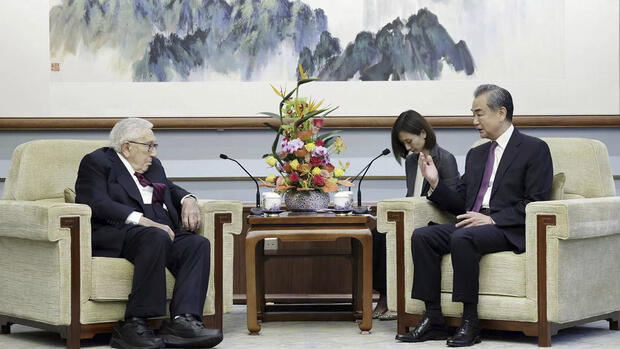Beijing Henry Kissinger had already made diplomatic history with his secret trips to China in the early 1970s, and now he’s trying again. On Tuesday, the former US Secretary of State spoke to Chinese Defense Minister Li Shangfu in Beijing, who is barred from entering the United States due to sanctions. A meeting with China’s top diplomat, Wang Yi, followed on Wednesday.
Despite all the rifts with the western superpower, China gave the 100-year-old American a friendly welcome. Kissinger is often referred to by Chinese politicians as an “old friend of the Chinese people”.
Wang Yi also praised Kissinger’s historic achievement in “breaking the ice” and strengthening Sino-US relations. “US policy toward China requires Kissinger-style diplomatic shrewdness and Nixon-style political courage,” he coaxed.
It remained unclear whether Kissinger traveled to Beijing on the initiative of the US government. The US State Department declined to comment on its meeting with Secretary of Defense Li. One cannot speak for “private individuals who are not part of the government,” it said.
During his visit to Beijing, Kissinger called for the United States and China to “resolve misunderstandings, peacefully coexist and avoid confrontation,” as quoted by the Reuters news agency. History and practice have shown time and time again that neither state can afford to treat the other as an adversary.
>> Read also: China’s weakness is becoming a risk for the global economy
The former US Secretary of State’s trip coincides with the visit of US climate chief John Kerry to Beijing. Kerry wants to revive the climate dialogue between the two countries, which the government suspended in protest at Nancy Pelosi’s trip to Taiwan.
Before Kerry, US Secretary of State Antony Blinken and Treasury Secretary Janet Yellen traveled to Beijing for talks to improve diplomatic relations between the two countries. After the scandal surrounding the launching of a suspected Chinese surveillance balloon over US territory in February, there was largely radio silence between the two countries for months.
Kissinger’s diplomatic initiatives in the early 1970s made a significant contribution to ensuring that communist China was no longer isolated from the West.
(Photo: ddp images/AP/)
Kissinger’s high reputation in the People’s Republic is largely due to his secret trips to China in 1971. Richard Nixon, who was then security adviser to US President Richard Nixon, laid the foundations in Beijing for establishing diplomatic relations between the US and the communist regime, which was then largely isolated from the West.
The following year, the Republican and convinced anti-communist Nixon was the first US President to visit the People’s Republic, which was founded in 1949. Even then, one of the main points of contention between the two countries was the status of Taiwan. The government in Taipei, with which the United States still had official diplomatic relations at the time, claimed to speak for all of China.
The so-called Shanghai Communiqué, which the People’s Republic of China and the United States agreed on at the conclusion of Nixon’s trip, states: “The United States recognizes that all Chinese on both sides of the Taiwan Straits believe that there is only one China exists and that Taiwan is part of China.”
Interest in the peaceful solution of the Taiwan question
The United States government does not question that position. She reaffirmed her interest in a peaceful solution to the Taiwan question by the Chinese themselves. This so-called strategic ambiguity is the official US policy towards Taiwan to this day.
As Secretary of State, Kissinger redefined the role of the National Security Advisor – since the Nixon administration, US national security interests have been controlled centrally from the White House. That’s how it is to this day. Kissinger has advised almost every US president on foreign policy over the past 50 years, sometimes more, sometimes less formally. He met Barack Obama and Donald Trump several times, and Biden has not yet made an official visit to the White House.
Kissinger had repeatedly emphasized that the conflict between the superpowers was causing him great concern. Shortly before his 100th birthday in May, he warned of the “great threats to the world”. He was “obsessed” with the topic of artificial intelligence, he said at an appearance in Washington. New arms control agreements would have to make AI regulation a top priority.
If world powers don’t find ways and means to contain AI, technological progress is “simply a mad race leading to disaster.” Kissinger then asked US President Joe Biden to approach China. “There is no way one side can win the AI race. Therefore, both sides should commit to not waging a high-tech war against each other.”
Assistance: Annett Meiritz and Katharina Kort
More: Kissinger turns 100 – “obsessed” with artificial intelligence
